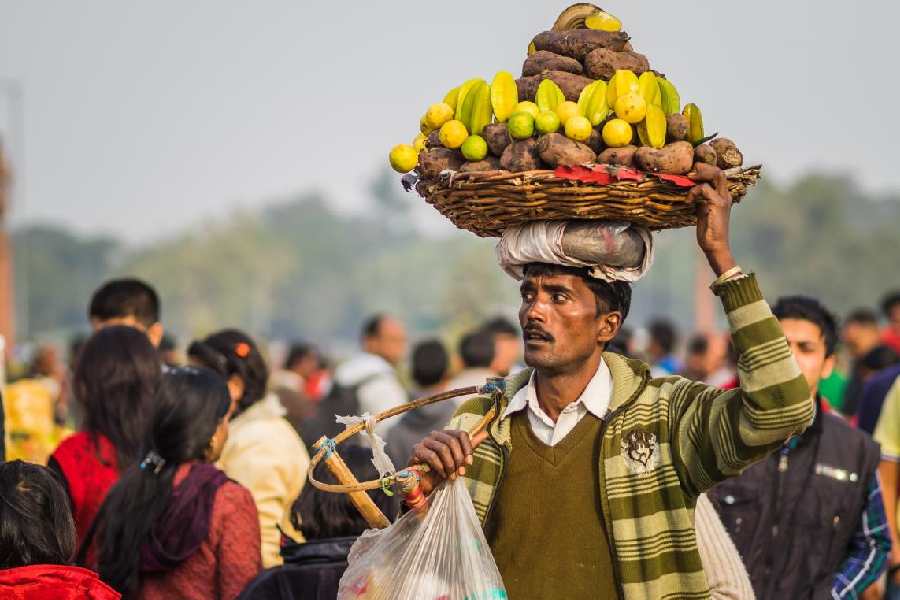In the bustling city of Calcutta, amidst the cacophony of loud horns and hurried footsteps of a street in Chandni Chowk, there exists a figure who is now an indelible part of its landscape. You see him and you know summer has arrived, him with his basket of tart-sweet mangoes under the peepul tree in the middle of tall office buildings. The temperature in Calcutta seems to be competing with the Thar Desert and eating raw mango is one way of avoiding heat stroke.
“This used to be my elder brother’s spot. Even now, when the jamuns arrive, I vacate this spot for him,” says our man. He cannot understand why anyone would want to know the story of his life, a fruit seller like him. Not that he has any problems engaging with someone who does. “Maine toh imandari ki roti khayi hai,” he says. Basically means, I am an honest hardworking man. The unsaid being, he has nothing to hide.
In the beginning, he replies to questions reluctantly, randomly. Sample these.
Where is he from? “Here.”
And he is? “Vishweshwar Sau of Siwan.”
So he is from Bihar? “Mere teen bhai hai, ek Dilli mein…”
All through he is robotically working on the fruit in his hands. Peeling off the skin till it reveals the tart pulp beneath. Proceeding to dip the fruits in water. Arranging them temptingly on the banana leaves lining his tokri.
At some point, some of Sau’s original reserve too peels off. In between slicing the mango, dishing it in a paper cone, sprinkling it with rock salt and handing it out to the gaggle of customers, he starts to reveal rag-tag details about his life.
Most of the stories are connected in some way with his brothers. So, he will suddenly have you know that he followed his eldest brother to this city. “My brother worked here since he was a boy, he never went to school,” says Sau, who has attended school but is cagey about the specifics. But he will make sure you know that he put both his sons through school and college. Not that a graduate degree has netted his 22-year-old elder son a well-paying job. “An uneducated boy on the streets of Calcutta has the chance of earning more,” he rambles on.
This neighbourhood has banks, insurance companies, merchant offices, row upon row of shops, a mall… A chunk of Sau’s customers are office-goers. As soon as a customer approaches, Sau stops talking. His entire posture changes, he sits ramrod straight, all attention on the job at hand. Only after the lot of them has dispersed does he relax. And even then he continues to work, his hands deftly moving the knife over the microscopically thin layers of the taalshash or taarfal as he calls them — yes, he sells those too — and his story unfolds further.
The concept of a singular home has been elusive for Sau. He recollects how he roamed the gullies of Chandni Chowk with his brother, with no set aim or idea and let the streets warm up to him. Some would call him a vagabond, he knows, but as he sees it that was his way of fitting into a new city, a new life.
Alife that now revolves around fruit. He points to the blackish-green mangoes in his basket and says, “These are the best kancha-mithe aam while the bright green-skinned ones are just tart.” Kancha-mithe is Bengali for unripe but sweet.
He should know, he spends hours searching for them at the fruit market in College Street as well as at Mechua Bazar, the largest wholesale fruit market in the city. “These are the last kancha-mithe aam of this season,” he adds. More fruit talk. The best talshash — sourced locally — comes from the wholesale bazaar at Sealdah’s Koley Market. For litchis too Sau prefers Sealdah, where locally-grown fruit can be found. But for jamuns, he heads to the wholesale fruit market at Baruipur where all kinds of fruits arrive from all over India. Says Sau, “Bengal might have many jamun trees but the jamuns here are smaller. The best jamuns, large ones, are grown in Bihar.”
The mere utterance of Bihar makes him emotional. He talks about his wife and children back home, his brothers’ families too, all living their lives in the ancestral village — Pacchatter, it sounds like — the whole extended family.
“Mere apno ne mujhe dhoka diya hai,” says Sau suddenly. His hands stop working and with his gaze firmly on the wicker basket, he starts to tell the story of what he most likely holds as his life’s tragedy. A story of kin turning on kin.
The gist of it — Sau and his brothers had bought a large plot of land from their better-off cousins; they planned to build individual houses on it. The plot had no access to a road but the cousin promised them right of passage through his land. Sau’s eldest brother was in charge of negotiations and, being illiterate, did not realise that there was nothing about right of passage in the sale deed. Later, the cousins simply refused them access. Which means those houses they dreamt of are yet to be built.
After a 12-year fight in court, the date of judgment is drawing near. Sau will head home during jamun season for the court hearing.
And it’s a wrap. Now, would he oblige by posing for a photograph? Says Sau with folded hands, “Write all you want, but don’t print my photo. At home, they know I work in the city. They don’t know I sit on the road...”










